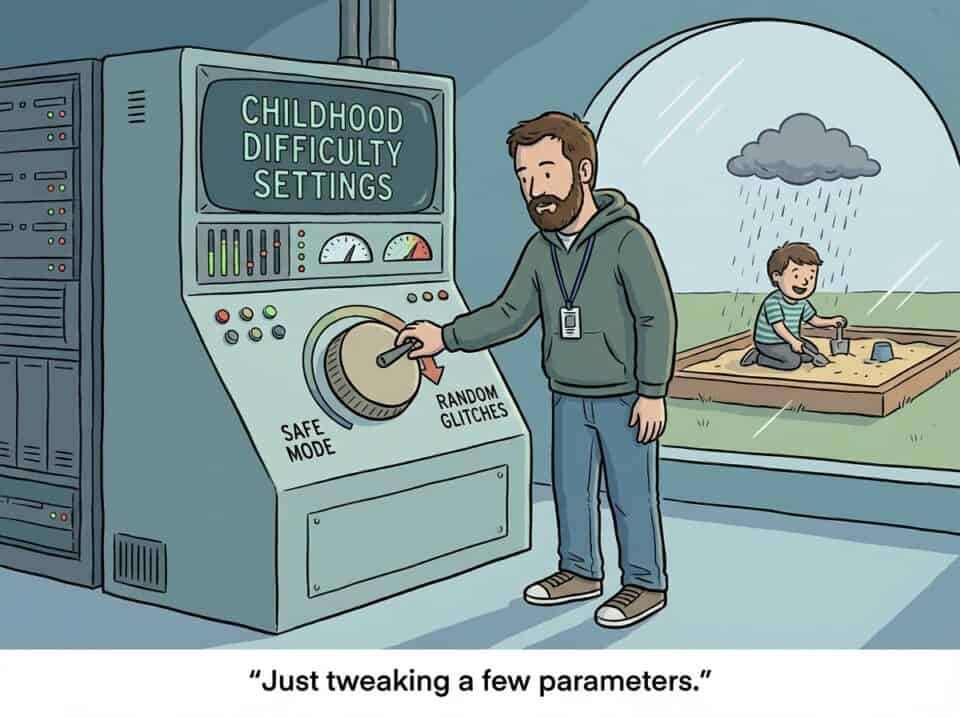It started years ago on a now-deleted Reddit thread, the kind of internet ghost story that haunts parenting forums at 2 a.m.
The premise was simple, vaguely threatening, and undeniably seductive. The original poster described a philosophy called the “Tidbits of Experience.” The core idea? Parents should intentionally curate small, controlled moments of unfairness, disappointment, or physical discomfort for their children to “inoculate” them against the real world.
We aren’t talking about chores or tough love. We are talking about manufactured glitches in the matrix of childhood happiness.
Key Takeaways
The Core Philosophy: The “Tidbits of Experience” method advocates for intentionally manufacturing small moments of unfairness, discomfort, or disappointment to inoculate children against real-world friction.
Chaos Engineering for Kids: Gaining traction in tech circles, this anti-snowplow parenting approach treats children like resilient systems that require stress testing to prevent future fragility.
Calculated Deception: Tactics include “micro-doses” of reality, such as lying about product availability, arbitrary denial of rewards, or manufactured internet outages to force adaptability.
The Privilege Paradox: Critics argue this method is a luxury for the wealthy; low-income families naturally encounter enough genuine struggle without needing to simulate adversity.
Risk vs. Reward: While proponents argue these low-stakes miseries build necessary calluses for adult resiliency, the method risks damaging the fundamental trust between parent and child.
Table of Contents
The Digital Ghost Story

I read about this years ago, before the thread vanished into the digital ether. The original poster claimed that modern parenting had removed the “texture” of life. By smoothing out every edge, we were raising children with zero tolerance for friction.
Their solution was the Tidbit: a micro-dose of reality.
Examples from that lost discussion included:
- The “Out of Stock” Lie: Telling a 6-year-old the store is out of their favorite cereal, even when it is sitting on the shelf behind a box of bran flakes, to teach adaptability.
- The Cold Shower: Turning the water temperature down for the last 30 seconds of a bath to teach physical resilience.
- The Arbitrary Loss: Flipping a coin to decide if the child gets dessert, regardless of behavior, to teach that chance plays a role in outcomes.
Why It Is Trending Again

Fast forward to late 2025. Parenting anxiety is at an all-time high. We have apps that track our kids’ REM cycles and smart socks that monitor their heart rates. Yet, looking at the fragility of the current generation, that deleted Reddit thread feels less like a horror story and more like a prophecy.
I spoke with Marcus T., a moderator of a private “Old School Parenting” Discord server (a place where parents verify their identity by uploading photos of cassette tapes). He claims the Tidbits method is quietly gaining traction among tech workers in Silicon Valley.
“We engineer systems to have redundancies and fail-safes,” Marcus told me. “But we engineer our kids to be fragile glass sculptures. The Tidbits method is just chaos engineering for toddlers.”
The Privilege Problem
Here is where the debate gets ugly, and why you will likely see this fight all over X (formerly Twitter) by noon.
Implementing “Tidbits of Experience” requires a massive amount of privilege. You must have a life so secure, so devoid of actual trauma, that you feel the need to manufacture artificial struggles for your offspring.
For a single mother working two jobs in Detroit, the world provides enough “tidbits” of disappointment. Her children do not need a simulated lesson on scarcity; they live it. This method is a luxury good, a way for the comfortable to cosplay struggle.
But… Does It Work?
Despite the ethical ick-factor, there is a compelling logic here. As we head into the holiday season, consider the resilience factor.
If you never let your child experience the meaningless injustice of a broken toy or a rained-out picnic, how do they handle their first breakup at 16? Or a layoff at 25?
The deleted Reddit thread argued that by age 10, a child should have experienced:
- Betrayal: A promise broken by an authority figure (within reason).
- Loss: Losing a game they practiced hard for.
- Discomfort: Walking a mile in rain without an umbrella.
Proponents argue these low-stakes miseries build the callus needed to handle high-stakes tragedies. Detractors call it gaslighting your own kids for sport.
The Verdict
I tried a “Tidbit” last week. I told my 8-year-old the internet was down for the entire weekend. I didn’t disconnect the router; I just changed the password.
The result? Three hours of screaming, followed by two days of him building a remarkably complex fort out of Amazon boxes and actually talking to his sister.
Was it manipulative? Yes. Did he survive? Absolutely.
The “Tidbits of Experience” might be the antidote to our snowplow parenting, or it might be the reason our kids put us in substandard nursing homes 40 years from now. The line between building character and breaking trust is razor-thin. Walk it carefully.
